
Unfounded, Baseless: India on UNHRC Chief’s Remarks on J&K, Manipur
In a strong rebuke, India has termed the recent statement made by the UN’s human rights chief, Volker Türk, on Jammu and Kashmir (J&K) and Manipur as “unfounded and baseless”. India’s permanent representative to the United Nations, Arindam Bagchi, made this statement on Monday, refuting the concerns raised by the UNHRC chief.
Türk, the UN High Commissioner for Human Rights, had expressed concerns over the restrictive laws in J&K and called for addressing the violence in Manipur. However, India has dismissed his remarks as “cherry-picking” and “based on limited information”.
The UNHRC chief’s statement came at a time when India is celebrating 75 years of its independence. India’s permanent representative to the UN, Arindam Bagchi, took to the floor to respond to the concerns raised byTürk. Bagchi said, “The world’s largest democracy continues to be a healthy, vibrant and pluralistic society.” He emphasized that India is committed to upholding human rights and has a robust democratic system in place.
The UNHRC chief’s statement has been seen as a rather critical one, with some interpreting it as an attempt to undermine India’s sovereignty. However, India has maintained that the statement is unfounded and baseless. The country has also pointed out that the UNHRC chief has not taken into account the numerous efforts made by India to protect human rights and promote democratic values.
One of the key concerns raised by the UNHRC chief was the restrictive laws in J&K. However, India has maintained that these laws are necessary to maintain law and order in the region. The country has also emphasized that the laws are being implemented in a fair and transparent manner, with due process being followed in all cases.
Another issue that was raised by the UNHRC chief was the violence in Manipur. While it is true that there have been instances of violence in the region, India has maintained that the situation is under control. The country has also emphasized that it is committed to addressing the concerns of the people of Manipur and ensuring their safety and security.
India has also pointed out that the UNHRC chief’s statement is selective and biased. The country has said that Türk has not taken into account the numerous human rights abuses that take place in other parts of the world. India has also emphasized that the UNHRC chief has not spoken out against the human rights abuses that take place in regions that are close to the UN headquarters.
The UNHRC chief’s statement has also been seen as an attempt to undermine India’s sovereignty and territorial integrity. India has maintained that the country’s territorial integrity is non-negotiable and that it will not tolerate any attempts to undermine it.
In conclusion, India’s response to the UNHRC chief’s remarks on J&K and Manipur has been strong and unequivocal. The country has maintained that the statement is unfounded and baseless and that it is an attempt to undermine India’s sovereignty and territorial integrity. India has also emphasized that it is committed to upholding human rights and promoting democratic values, and that it will not tolerate any attempts to undermine its democratic system.
It is worth noting that the UNHRC chief’s statement has been met with criticism from many quarters. Many have seen the statement as an attempt to undermine India’s sovereignty and territorial integrity, and have called for the country to stand firm against such attempts.
In the end, it is clear that the UNHRC chief’s statement on J&K and Manipur has been met with a strong rebuke from India. The country has maintained that the statement is unfounded and baseless and that it is an attempt to undermine India’s sovereignty and territorial integrity. India has also emphasized that it is committed to upholding human rights and promoting democratic values, and that it will not tolerate any attempts to undermine its democratic system.



